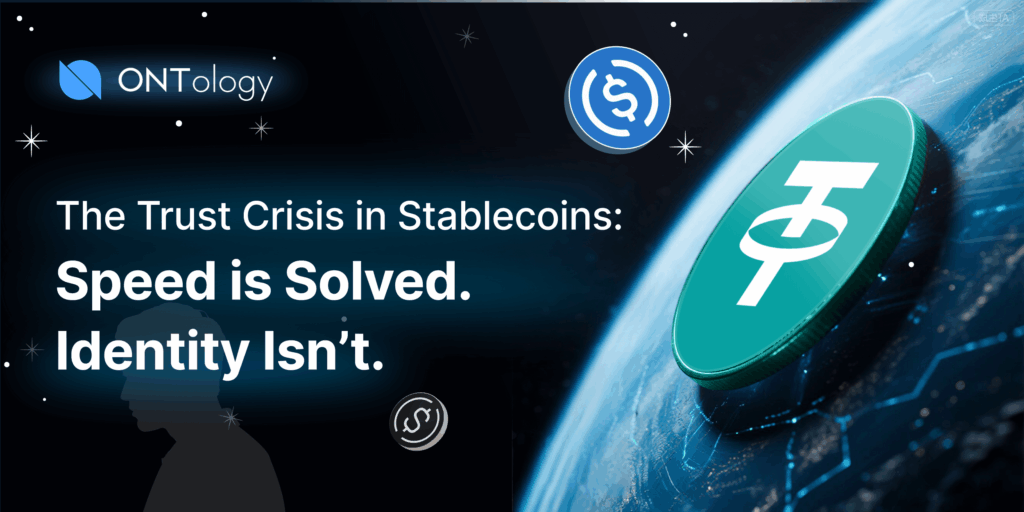The biggest challenge in scaling stablecoin payments isn’t speed. It’s trust.
Stablecoins are everywhere. They’re powering remittances, cross-border commerce, crypto payroll, and even merchant checkout systems. From Stripe to Shopify to major exchanges, stablecoin adoption is accelerating.
But while blockchains have solved the problem of speed and cost, they’ve quietly ignored the biggest bottleneck in real-world use: identity.
If stablecoins are going to scale globally, across regions, merchants and users, they need more than fast rails. They need a decentralized identity layer.
The Problem With Stablecoin Compliance Today
Most stable coins weren’t built with compliance in mind. And now that they’re being used in payments, cracks are showing.
- Merchants don’t know who they’re accepting money from
- Platforms are duct-taping KYC providers into apps
- Users go through verification again and again
- There’s no standard for crypto KYC that works across wallets, bridges, and dApps
The result? A fragile trust layer built on centralized data silos and repetitive identity checks. The exact same problems crypto was supposed to solve.
Stablecoin Payments Need Verifiable Identity, Not Just Wallets.
Verifiable Identity is the missing layer in the stablecoin stack.
As governments push for stablecoin regulation such as MiCA in the EU and the GENIUS Act in the US, platforms are scrambling to become compliant.
But compliance doesn’t have to mean surveillance.
With decentralized identity, users can hold their own credentials, verify once, and move between apps and services without repeating KYC. This is the foundation for self-sovereign identity, where users control their data and platforms remain compliant without storing sensitive information.
What’s Needed: A Portable, Privacy-First Trust Layer
Stablecoin adoption at scale will only happen if three things become possible:
- Users prove who they are without exposing everything
- Merchants can verify transactions without handling private data
- Developers can plug into identity infrastructure that works cross-chain
That’s what Ontology is building. A modular identity and privacy framework that makes stablecoin payments secure, compliant, and user-controlled.
Ontology: The Identity Infrastructure for Stablecoin Adoption
Unlike issuers, Ontology isn’t creating another dollar-pegged token. We’re building the trust infrastructure that makes stablecoins usable in the real world.
Here’s what that looks like:
- DID-based KYC that users control
- Zero Knowledge Proofs to verify facts without revealing data
- Reusable identity credentials for wallets, dApps, and fiat on-ramps
- Cross-border compliance without centralized trust
This infrastructure goes beyond payments. The next era of Web3 relies on a rebuilding of the crypto identity infrastructure.
The Future of Stablecoin Compliance is User-Controlled
If stablecoins want to compete with traditional infrastructure, they can’t just be faster. They have to be trusted. And that trust can’t be outsourced to centralized APIs or third party data silos.
It has to be built into the protocol layer and embedded in how users verify themselves, how dApps authorize transactions, and how compliance gets done in a decentralized world.
Speed is solved. Identity isn’t.
Ontology is solving it.
About Ontology
Ontology is a high-performance, open-source blockchain specializing in decentralized identity and data infrastructure. Built to power the next generation of Web3 applications, Ontology provides developers with the tools to build secure, privacy-preserving systems through Decentralized Identifiers (DIDs) and Verifiable Credentials. With a focus on self-sovereign identity, compliance-ready infrastructure, and cross-chain interoperability, Ontology enables trust in every transaction, without sacrificing user control. Whether you’re building for payments, DeFi, or real-world digital identity, Ontology offers the modular trust layer Web3 has been missing.
Connect with Us
Stay up to date on decentralized identity, privacy infrastructure, and everything Ontology is building:
Have questions or want to collaborate? Drop us a message, we’re always open to building with developers, creators, and partners shaping the future of Web3.

